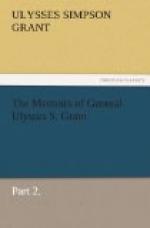I am aware that this last statement may be disputed and individual testimony perhaps adduced to show that in ante-bellum days the ballot was as untrammelled in the south as in any section of the country; but in the face of any such contradiction I reassert the statement. The shot-gun was not resorted to. Masked men did not ride over the country at night intimidating voters; but there was a firm feeling that a class existed in every State with a sort of divine right to control public affairs. If they could not get this control by one means they must by another. The end justified the means. The coercion, if mild, was complete.
There were two political parties, it is true, in all the States, both strong in numbers and respectability, but both equally loyal to the institution which stood paramount in Southern eyes to all other institutions in state or nation. The slave-owners were the minority, but governed both parties. Had politics ever divided the slave-holders and the non-slave-holders, the majority would have been obliged to yield, or internecine war would have been the consequence. I do not know that the Southern people were to blame for this condition of affairs. There was a time when slavery was not profitable, and the discussion of the merits of the institution was confined almost exclusively to the territory where it existed. The States of Virginia and Kentucky came near abolishing slavery by their own acts, one State defeating the measure by a tie vote and the other only lacking one. But when the institution became profitable, all talk of its abolition ceased where it existed; and naturally, as human nature is constituted, arguments were adduced in its support. The cotton-gin probably had much to do with the justification of slavery.




